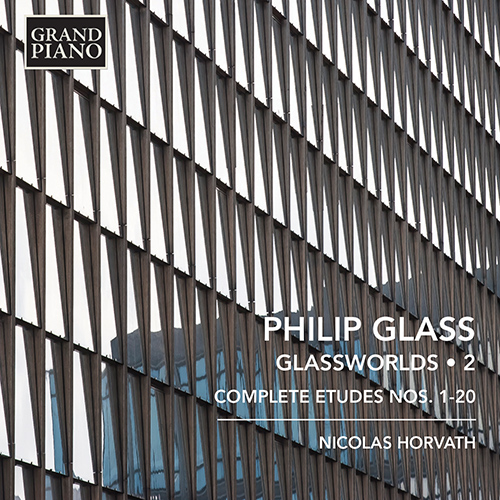
About this Release
GLASS, PHILIP (b. 1937)
Glassworlds • 2
Complete Etudes Nos. 1–20
- Nicolas Horvath, piano
Two decades of musical evolution and discovery lie behind Philip Glass’ 20 Etudes. They explore a variety of textures, tempi, and techniques and distil intensely intimate personal statements to their purest elements. Providing new music for his solo concerts, they challenged and enhanced Glass’ own piano technique and also provided an unintended but compelling self-portrait of the composer.
This recording was made on a modern instrument: Steinway Model D 499495
Tracklist
|
Etudes, Book 1 (1996) (00:38:00 )
|
|
1
Etude No. 1 (00:03:35)
|
|
2
Etude No. 2 (00:03:03)
|
|
3
Etude No. 3 (00:03:54)
|
|
4
Etude No. 4 (00:03:27)
|
|
5
Etude No. 5 (00:04:19)
|
|
6
Etude No. 6 (00:03:15)
|
|
7
Etude No. 7 (00:03:51)
|
|
8
Etude No. 8 (00:05:43)
|
|
9
Etude No. 9 (00:02:11)
|
|
10
Etude No. 10 (00:05:19)
|
|
Etudes, Book 2 (2013) (00:45:00 )
|
|
11
Etude No. 11 (00:04:03)
|
|
12
Etude No. 12 (00:04:29)
|
|
13
Etude No. 13 (00:03:23)
|
|
14
Etude No. 14 (00:03:35)
|
|
15
Etude No. 15 (00:03:07)
|
|
16
Etude No. 16 (00:04:59)
|
|
17
Etude No. 17 (00:06:15)
|
|
18
Etude No. 18 (00:03:14)
|
|
19
Etude No. 19 (00:05:03)
|
|
20
Etude No. 20 (00:06:41)
|
The Artist(s)
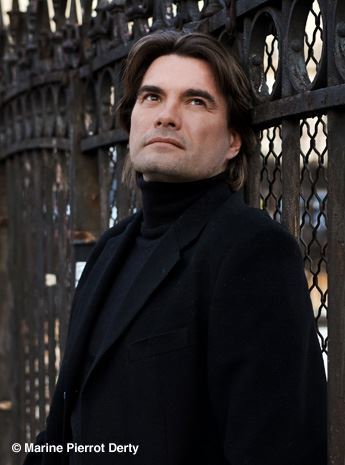 Nicolas Horvath began his music studies at Monaco’s Académie de Musique et de Théâtre Prince Rainier III and soon began to make an impression on a number of artists who would become his mentors. Aged 16 he caught the attention of the American conductor Lawrence Foster before coming to the notice of several distinguished international pianists, including Liszt specialist Leslie Howard. He is the recipient of numerous awards, including First Prize at both the Scriabin and the Luigi Nono International Competitions. He has become noted for hosting concerts of unusual length, sometimes lasting over twelve hours, such as the overnight performance of the complete piano music of Erik Satie at the Paris Philharmonie before a cumulative audience of 14,000 people. In 2019 he performed alongside Philip Glass at the same venue in a programme devoted to the American composer’s piano music. Horvath’s extensive and varied discography on Grand Piano includes the highly acclaimed Philip Glass solo piano music edition, Glassworlds; the complete piano works of Erik Satie; piano sonatas by the Estonian composer Jaan Rääts and music by the American experimental composer Alvin Lucier; Carl Czerny’s 30 Études; and lesser-known piano music by Claude Debussey, Anne-Louise Brillion de Jouy and Hélène de Montgeroult. Nicolas is a Steinway Artist.
Nicolas Horvath began his music studies at Monaco’s Académie de Musique et de Théâtre Prince Rainier III and soon began to make an impression on a number of artists who would become his mentors. Aged 16 he caught the attention of the American conductor Lawrence Foster before coming to the notice of several distinguished international pianists, including Liszt specialist Leslie Howard. He is the recipient of numerous awards, including First Prize at both the Scriabin and the Luigi Nono International Competitions. He has become noted for hosting concerts of unusual length, sometimes lasting over twelve hours, such as the overnight performance of the complete piano music of Erik Satie at the Paris Philharmonie before a cumulative audience of 14,000 people. In 2019 he performed alongside Philip Glass at the same venue in a programme devoted to the American composer’s piano music. Horvath’s extensive and varied discography on Grand Piano includes the highly acclaimed Philip Glass solo piano music edition, Glassworlds; the complete piano works of Erik Satie; piano sonatas by the Estonian composer Jaan Rääts and music by the American experimental composer Alvin Lucier; Carl Czerny’s 30 Études; and lesser-known piano music by Claude Debussey, Anne-Louise Brillion de Jouy and Hélène de Montgeroult. Nicolas is a Steinway Artist. The Composer(s)
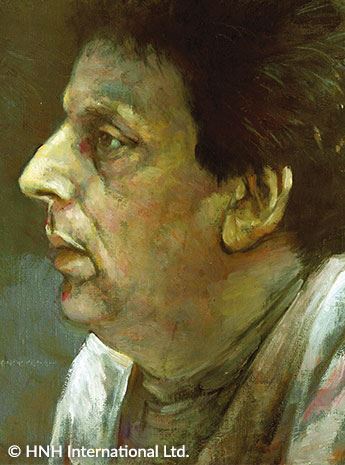 Piano is Philip Glass’ primary instrument (he also studied violin and flute); he composes at the keyboard. With its seemingly contradictory elements of lyricism and percussiveness, it is in some ways the ideal medium for Glass’ musical language. With its deep roots in tradition (spanning the Classical, Romantic and Modern eras), the instrument embodies the composer’s desire to merge new ideas with classic forms. It is perhaps via piano (and, by extension, keyboard) that performers and listeners can make the most direct and personal contact with Glass’ musical genius.
Piano is Philip Glass’ primary instrument (he also studied violin and flute); he composes at the keyboard. With its seemingly contradictory elements of lyricism and percussiveness, it is in some ways the ideal medium for Glass’ musical language. With its deep roots in tradition (spanning the Classical, Romantic and Modern eras), the instrument embodies the composer’s desire to merge new ideas with classic forms. It is perhaps via piano (and, by extension, keyboard) that performers and listeners can make the most direct and personal contact with Glass’ musical genius. Reviews
“…Horvath performs the works…the way that Glass would like to himself. And there is hardly a higher compliment that one could pay to a performing musician.” – Fanfare
“Horvath applies a Romantic interpretation of the Études, which greatly emphasizes their expressive nature and brings the etudes to life.” – primephonic
“Not to slight Glass’s own considerable talents, but Horvath has a richer tone, and the Etudes really blossom under his fingers; as he plays them, there is no denying their place in the Etude tradition.” – Culture Catch
“[Horvath]’s a fine pianist with a virtuosic charisma and a thoroughly romantic view of these pieces. That’s perfectly appropriate… The approach works especially well in the extroverted 15, and Horvath’s formidable technique serves the much more minimal 10 just as effectively. On the more lyrical side of the emotional spectrum, Horvath’s fine use of rubato gives Etude 2 an expressive immediacy that other performances I’ve heard lack. ” – American Record Guide
“Nicolas Horvath, with precise playing and imaginative interpretation has made Glassworlds 2 an indispensable reference for the serious enthusiast as well as marking an important milestone in the evolution of the music of Philip Glass.” – Sequenza21.com
“The brilliant Lisztian-Rachmaninovian virtuosity that Nicolas Horvath brings to the cycle generates a good deal of bravado and even excitement. It makes of the Etudes a series of grand flourishes, of tumultuous outbursts that become something more than a sort of rote attention to the motifs would give you.” – Gapplegate Classical-Modern Music Review
“…Horvath can perform these etudes in a way that brings intense expression to their abstract qualities without ever overplaying his hand…that one can, indeed, listen to these twenty etudes in a single sitting as a “virtual concert experience.”” – Examiner.com

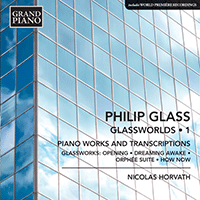
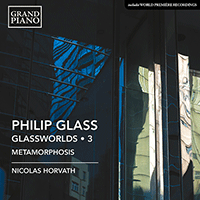
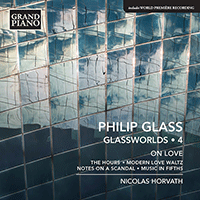
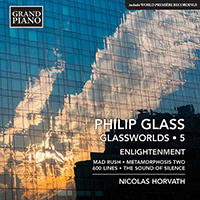
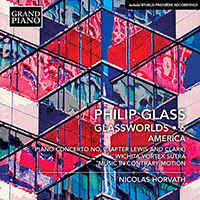
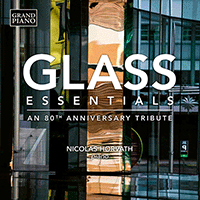
 Grand Piano has gained a reputation for producing high quality recordings of rare keyboard gems. Dedicated to the exploration of undiscovered piano repertoire, the label specialises in complete cycles of piano works by many lesser-known composers, whose output might otherwise have remained unknown and unrecorded.
Grand Piano has gained a reputation for producing high quality recordings of rare keyboard gems. Dedicated to the exploration of undiscovered piano repertoire, the label specialises in complete cycles of piano works by many lesser-known composers, whose output might otherwise have remained unknown and unrecorded.






